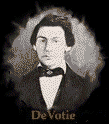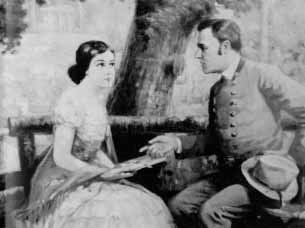
Part One
1856 - 1865
THE FOUNDING AND THE FIRST WEEKS
It was on March 9, 1856 that eight young men braved a storm to
meet in an old schoolhouse with the intent of forming an
organization called Sigma Alpha Epsilon. The goal of these men
was to perpetuate the warm friendships they had already formed.
After a few months of planning, and a few late hours by
candlelight, they formed what is today the largest national
fraternity in America. 
The leader of the eight, Noble Leslie DeVotie, was an outstanding young man who would graduate as valedictorian of his class, become a pastor, and go down in American history as the first man to die in the Civil War. It was his idea to form the fraternity, and invited his close friends to join him in forming the first chapter.
The other seven founders were also outstanding young men who
went on to become very successful. Cockrell became editor of a
newspaper, and died in the war. Dennis was one of
"Terry’s Texas Rangers". Rudulph became a Colonel
and lost his arm in the war, but later became president of
Pleasant Hill Academy. Patton was the fraternity’s first
president, and Foster became a principal, and during the war, an
escort for Jefferson Davis. Cook received his degree in medicine,
and became a member of the Texas Legislature before being appointed medical examiner of the U.S. Army and Navy by President
Cleveland. John Webb Kerr, the fraternity’s first secretary,
graduated from Harvard Law School with his LL.B. in 1858.
appointed medical examiner of the U.S. Army and Navy by President
Cleveland. John Webb Kerr, the fraternity’s first secretary,
graduated from Harvard Law School with his LL.B. in 1858.
At the fraternity’s second meeting on March 15, 1856, the founders elected permanent officers, and a week later, initiated the first pledge and new member, Newton Nash Clements. Clements was sought after by the other fraternities on campus, but chose to go with DeVotie and the rest of the founders. Clements later became Speaker of the Alabama House of representatives and as a U.S. Congressman.
EXPANSION AND THE CIVIL WAR
When school resumed in the fall of 1856, only Abner Edwin Patton remained of the founders, and with nine others, formed the whole chapter. The second chapter was founded at the University of Nashville- now Vanderbilt- on January 17, 1857, and a month later, the third was formed at University of North Carolina at Chapel Hill. The fraternity continued its rapid expansion, and by summer of 1858 had eight chapters. It was in August of that year that the first convention was held. In 1859, the first directory was published by the Grand Chapter of NC Xi, and showed 165 members in ten chapters.
"Sigma Alpha Epsilon was born, grew and thrived," wrote the fraternity’s great historian, Billy Levere, "and five years passed. Then the war came, days of iron and blood, and into that war the fraternity went, and there was not a battlefield in all the republic where some bright-faced, courageous youth who wore its badge did not perform deeds worthy of men of steel." Nearly all members of the fraternity fought in the war, most for the Confederacy. 70 of the 376 Sig-Alphs that served were killed in service.
THE STORY OF LUCY PATTIE
 There is a story from the civil war that explains an act of
loyalty and devotion so astonishing to lead to the only woman
member of the fraternity. Kentucky Chi was only a few months old
when the war came, filled with outstanding young cadets like John
B. Kent. Nearby the K.M.I. campus was the home of the Pattie
family, where the young men could escape from the strains of
military discipline. The Patties had three children, of whom Kent
and others were all friends with. Kent loved to talk with Lucy
Pattie about his fraternity, and she loved to listen. When the
war began, the military institute emptied, and Kent was among the
last to leave. Kent had been given the task of attending to the
fraternities papers, containing information about ritual,
constitution, and business of the chapter. As the day drew nearer
for him to leave, he felt more strongly the need to provide for
the care of these documents. He finally determined to entrust
them to young "Miss Lucy," who he knew would keep and
protect them through the time of war. She promised to keep them
"where neither friend nor foe might find them."
There is a story from the civil war that explains an act of
loyalty and devotion so astonishing to lead to the only woman
member of the fraternity. Kentucky Chi was only a few months old
when the war came, filled with outstanding young cadets like John
B. Kent. Nearby the K.M.I. campus was the home of the Pattie
family, where the young men could escape from the strains of
military discipline. The Patties had three children, of whom Kent
and others were all friends with. Kent loved to talk with Lucy
Pattie about his fraternity, and she loved to listen. When the
war began, the military institute emptied, and Kent was among the
last to leave. Kent had been given the task of attending to the
fraternities papers, containing information about ritual,
constitution, and business of the chapter. As the day drew nearer
for him to leave, he felt more strongly the need to provide for
the care of these documents. He finally determined to entrust
them to young "Miss Lucy," who he knew would keep and
protect them through the time of war. She promised to keep them
"where neither friend nor foe might find them."
The years passed, but Lucy never forgot her promise to Kent. Word came to Lucy of Kent’s death in the cruel charge at Shiloh. When the war finally ended, young, new faces returned to K.M.I., and Kentucky Chi was revived. Many men tried to talk to Miss Lucy about the secret papers, but she adamantly refused to hand them over until one of the cadets would give her the proper grip of the hand. Finally, a young man named Albert McMahan gave her the grip, and she returned the documents unharmed. She had been faithful to her trust.
The gratitude and delight of the young brothers at her devotion and care of their ritual and other private papers was so great that they voted Lucy Pattie a member of the fraternity and gave her the badge.